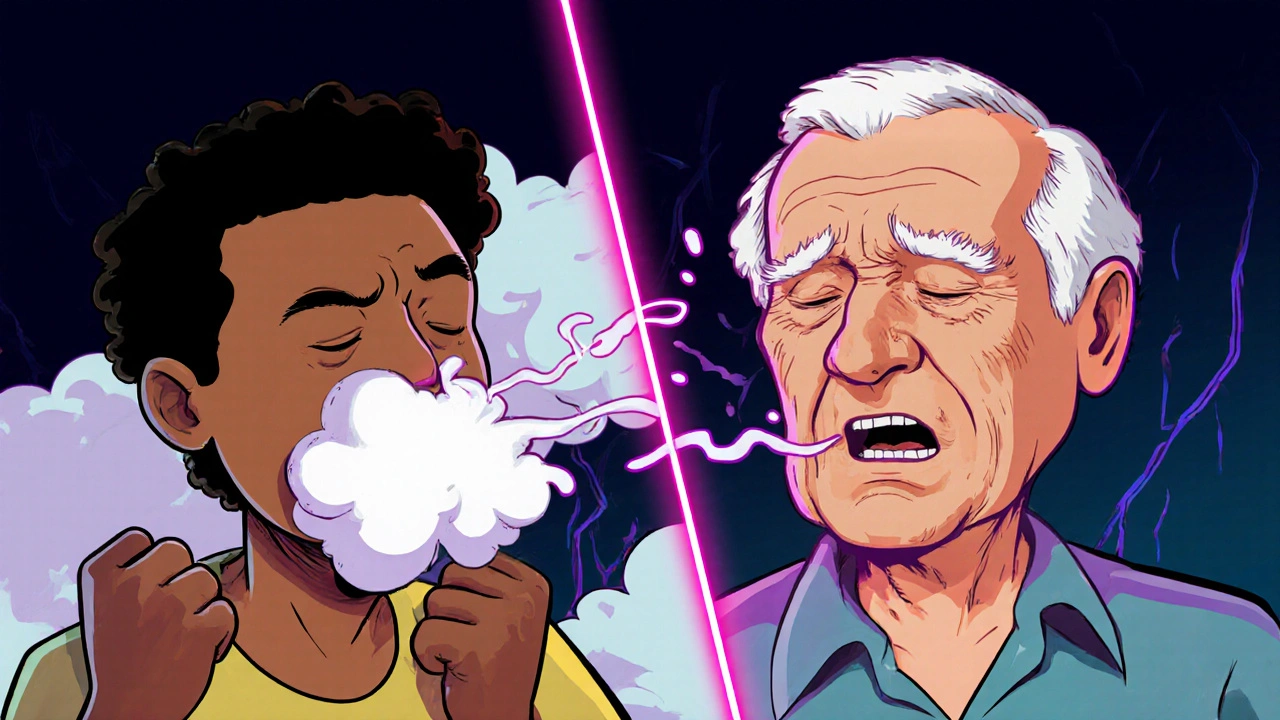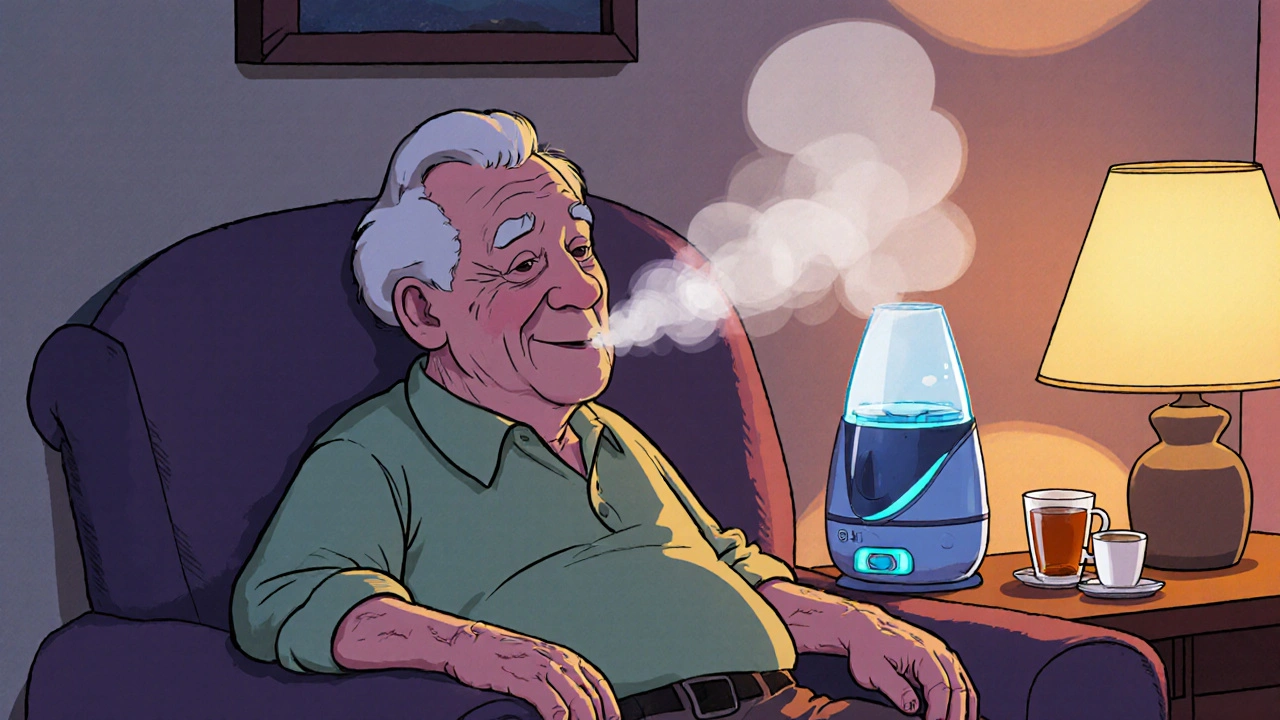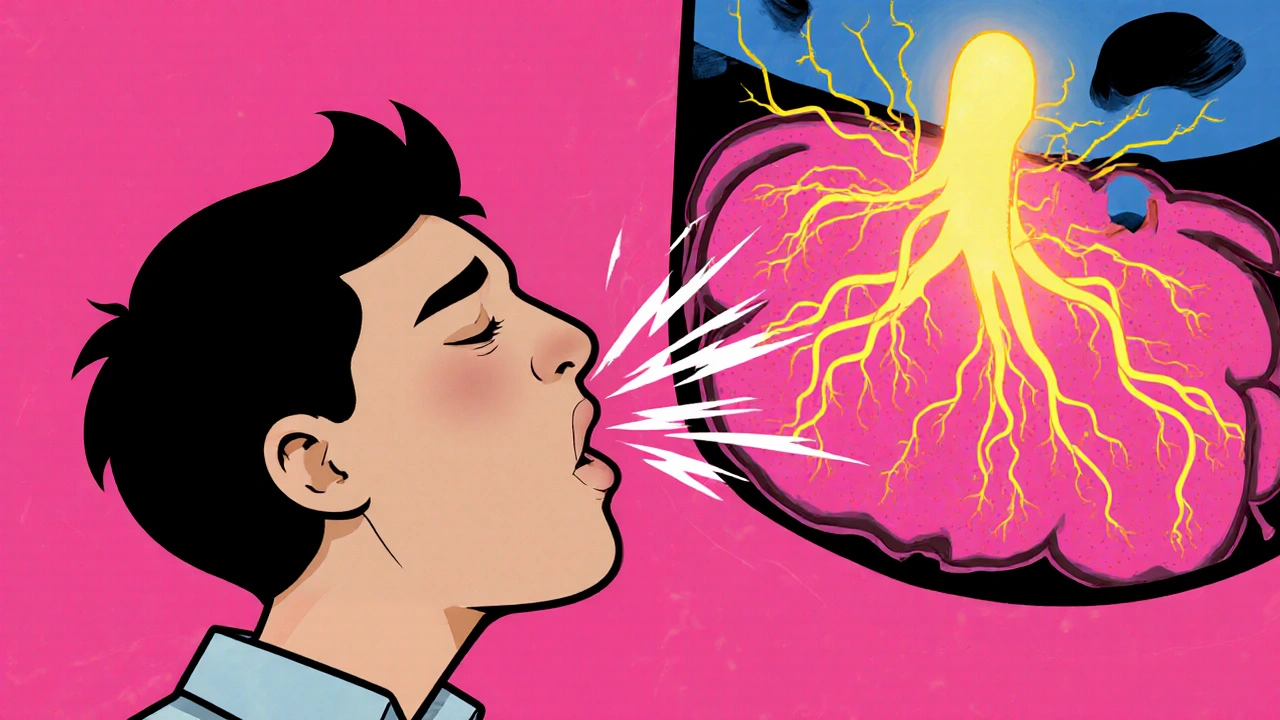When we think about getting older, we usually picture grey hair, retirement plans, or slower reflexes. Sneezing is a sudden, involuntary expulsion of air from the lungs triggered by irritation of the nasal lining. Most of us have sneezed countless times, but did you know that the way we sneeze actually shifts as we age? In this article we’ll break down why those tiny explosions change, what to expect in different decades of life, and how you can keep the sneeze‑train running smoothly even after the golden years.
What actually happens when you sneeze?
First, a quick refresher on the sneeze mechanism. The nasal lining (or nasal mucosa) contains sensory nerve endings that are extremely sensitive to dust, pollen, cold air, and certain chemicals. When these receptors detect an irritant, they send a signal via the trigeminal nerve to the brainstem. The brain then triggers a cascade:
- Deep inhalation to fill the lungs.
- Closure of the throat (the glottis) to build pressure.
- Forceful contraction of chest muscles.
- Rapid opening of the mouth and nose, expelling air at up to 100 mph.
That burst of air clears the irritant, resets the nasal environment, and-often-provides a short‑lived sense of relief.
How aging reshapes the nasal reflex
With age, several components of the sneeze reflex undergo subtle but noticeable changes:
- Nasal mucosa thins. The protective mucus layer becomes less viscous, making it harder for tiny particles to adhere.
- Sense of smell declines. A reduced olfactory ability can blunt the detection of certain triggers, like strong perfumes.
- Muscle strength wanes. The intercostal and diaphragm muscles that generate sneeze pressure lose some power, often resulting in a softer sneeze.
- Neural conduction slows. The speed at which the trigeminal nerve fires can drop by about 15‑20% after the fifth decade.
These shifts don’t mean seniors stop sneezing; they just experience it differently.
Age‑related changes in common sneezing triggers
Below is a quick look at how typical irritants affect younger adults versus older adults:
| Trigger | 20‑30 years | 50‑60 years | 70 + years |
|---|---|---|---|
| Dust & pollen | High | Moderate | Low‑moderate |
| Cold air | Moderate | Low | Very low |
| Spicy foods (capsaicin) | High | High | High |
| Strong perfumes | High | Moderate | Low |
| Dry indoor air | Low | Moderate | High |
Note the rise in sensitivity to dry indoor air for people over 70. That’s because the nasal mucosa loses its ability to retain moisture, which can cause irritation that ends in a sneeze.

Health conditions and medications that influence sneezing in seniors
Older adults often juggle multiple prescriptions, and several of them can affect the sneeze reflex either directly or indirectly:
- ACE inhibitors. These blood‑pressure drugs can increase bradykinin levels, leading to a chronic dry cough that sometimes masquerades as frequent sneezing.
- Antihistamines. While they tame allergy‑driven sneezes, first‑generation antihistamines can dry out the nasal mucosa, potentially prompting more reflex sneezes in response to minor irritants.
- Beta‑blockers. By dampening sympathetic nervous activity, they may reduce the force of a sneeze, making it feel “weak” or “unfinished.”
- Chronic rhinitis. Conditions like vasomotor rhinitis become more common after 60, causing a baseline nasal congestion that can be triggered by temperature shifts.
- Upper respiratory infections. Seniors are more prone to lingering infections; the lingering inflammation keeps the nasal nerves on high alert.
Understanding these interactions helps you and your doctor decide whether a medication tweak could reduce annoying sneeze episodes.
Practical tips to keep sneezing comfortable as you age
If you’re noticing a change in your sneeze pattern, try these simple, evidence‑backed strategies:
- Hydrate the nasal passages. A humidifier set to 40‑50% humidity can offset the drying effect of indoor heating.
- Use saline nasal sprays. An isotonic spray (0.9% saline) restores moisture without medication.
- Manage indoor allergens. Wash bedding in hot water weekly, use HEPA filters, and keep pets off the bedroom.
- Adjust diet. Spicy foods remain a reliable sneeze trigger; if you’re sensitive, moderate intake.
- Review medications. Ask your pharmacist whether any current drugs could be influencing nasal dryness.
- Practice gentle breathing. When you feel a sneeze coming, a light breath through the nose can sometimes calm the reflex, preventing an explosive sneeze.
These habits not only help with sneezing but also support overall respiratory health-something that matters a lot for seniors.

When to see a doctor about sneezing changes
Most sneezing is benign, but certain signs warrant professional attention:
- Sudden increase in frequency (more than 3‑4 sneezes per day for several weeks).
- Accompanying nasal bleeding, severe congestion, or loss of smell.
- Episodes triggered by non‑allergic factors like temperature changes only after age 60.
- Chest pain or shortness of breath surrounding a sneeze.
These could point to underlying issues such as nasal polyps, sinus infections, or medication side effects.
Frequently Asked Questions
Frequently Asked Questions
Do older adults sneeze less often?
On average, the frequency drops slightly because the nasal mucosa becomes less reactive, but many seniors still sneeze regularly, especially when exposed to dry air or strong scents.
Can I take antihistamines safely if I’m over 70?
Second‑generation antihistamines (like cetirizine or loratadine) are generally safe and cause less drowsiness. First‑generation types can dry out the nasal passages, potentially increasing non‑allergic sneezes.
Why does my sneeze feel weaker now?
Reduced muscle strength and slower nerve conduction mean the force behind the expelled air is lower. It’s a normal part of aging.
Is there a link between sneezing and heart health?
A sudden sneeze can raise intrathoracic pressure, momentarily affecting heart rhythm, but for most healthy seniors it’s harmless. People with severe arrhythmias should discuss sneezing episodes with their cardiologist.
How can I tell if my sneezes are allergy‑related or age‑related?
Allergy‑related sneezes often accompany itchy eyes, watery discharge, and a clear seasonal pattern. Age‑related changes are more constant and linked to dry air or medication effects.
Bottom line: sneezing doesn’t disappear with age-it just gets a new spin. By staying aware of the physiological shifts, managing the environment, and keeping an eye on medication side effects, you can keep that reflex working for you, not against you.

Reading about the sneezing reflex aging like a reluctant poem makes me think about how we all cling to our tiny explosions of chaos. The article nails the fact that as our mucosa thins, the universe seems to whisper a gentler “achoo.” Yet, we shouldn’t dismiss the sheer audacity of a geriatric sneeze that still rattles the ribs. It’s a reminder that bodily rebellion never truly retires, even when the body claims a pension. Keep those nasal passages hydrated and the spirit stays defiantly alive.
The breakdown of the nasal reflex was clear and useful. I especially liked the tip about humidifiers for dry indoor air.
Medication side‑effects can masquerade as sneezes, especially ACE inhibitors that boost bradykinin. Keep an eye on that dry cough that feels like a sneeze in disguise.
It’s fascinating how the neural conduction speed slows; it’s like the brain’s mail carrier taking a coffee break. The philosophical angle-our bodies re‑negotiating reflexes-adds depth. Typos happen, but the insight remains clear.
Ever notice how the government never tells you about the secret agenda behind humidity control in senior homes? Those dry air systems are a covert operation to make us sneeze more, keeping us dependent on pharmaceutical fixes. The article hints at medication interplay, but the real puppet‑masters are the pharma giants lobbying for higher sales of antihistamines. I suspect the “dry indoor air” warning is a distraction from the bigger plot. Stay woke, keep your windows open, and question every humidifier they hand you.
Hydration is key; simple as that.
The sneeze reflex is a cascade that begins with the nasal mucosa detecting an irritant, which then fires afferent signals through the trigeminal nerve to the brainstem. Once the brainstem registers the signal, it initiates a deep inhalation to maximally fill the lungs, preparing the pressure reservoir. The glottis then snaps shut, creating a sealed chamber where muscular contraction can build up substantial intra‑thoracic pressure. Intercostal and diaphragmatic muscles contract in a coordinated fashion, propelling air upward while the facial muscles tighten. At the moment of release, the glottis opens explosively, allowing compressed air to exit at velocities that can exceed 100 miles per hour. This rapid expulsion clears the nasal passage of the offending particle, restoring homeostasis. As we age, the mucosal layer thins, reducing the density of sensory receptors and altering the threshold for activation. Concurrently, the olfactory epithelium deteriorates, dulling the detection of volatile triggers such as perfume or spice. Muscular atrophy further diminishes the force behind the sneeze, often resulting in a softer sound and reduced airflow. Neural conduction velocity also declines, introducing a slight latency between stimulus and response. These physiological changes, while subtle, collectively reshape the sneeze’s character in the elderly. However, the core circuitry remains intact, meaning that older adults can still experience powerful sneezes under the right conditions, like exposure to dry air or capsacin. Understanding these mechanisms enables clinicians to differentiate between age‑related attenuation and pathological causes such as nasal polyps.
Oh, sure, the article tells us to drink water and use saline sprays, but what about the unseen forces that keep us in perpetual sneezing loops? I’d argue that the real culprit is the hidden agenda of the sanitation industry, flooding us with chemicals that irritate the nose. It’s dramatic, it’s alarming, and it forces us to question everything we thought we knew about simple reflexes.